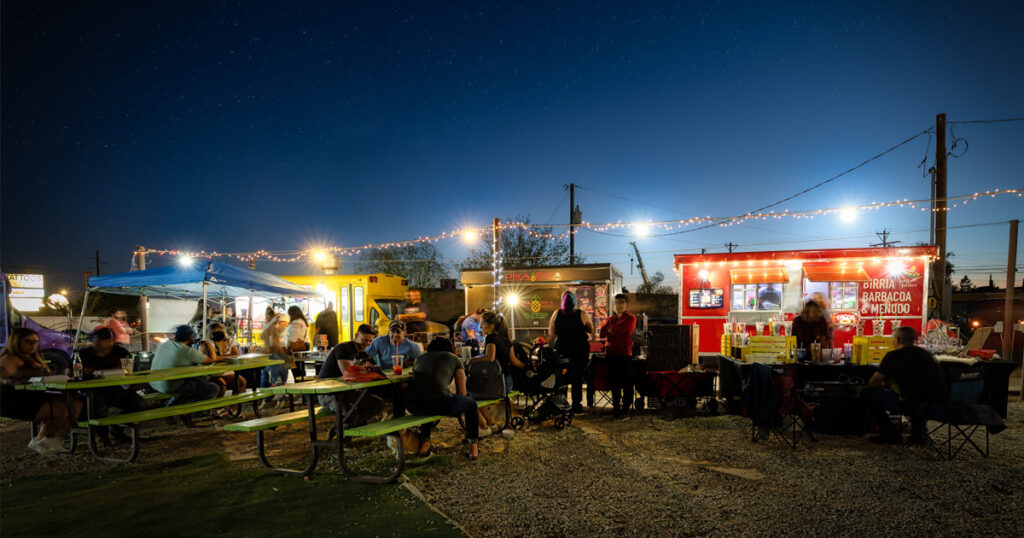
Food trucks are a great way to have a profitable and flexible business in the food industry. If you’re thinking about opening a food truck in Texas, you may be wondering about food truck sales tax in Texas. Do you need to pay sales tax? How do you collect sales tax? And are there cases where you don’t need to pay sales tax?
Read on to learn more about your food truck sales tax obligations in Texas.
Do you need to pay food truck sales tax in Texas?
Yes. Food trucks in Texas pay sales tax on every purchase, just like a brick and mortar restaurant would. Food trucks are required to pay sales tax even on cash purchases.
That means that you need to calculate and charge the right sales tax rate for every purchase. You also need to set that sales tax money aside, and then file and pay the sales tax owed periodically.
If that sounds overwhelming, don’t worry. DAVO can connect with your POS system to automatically collect, set aside, file, and pay sales tax. Keep reading to learn about how it works.
Some food truck owners decide to include sales tax in menu pricing, while others charge customers sales tax at the point of purchase. Whatever you decide, keep in mind that you cannot overcharge for sales tax. As the business owner are ultimately responsible for paying the state the correct sales tax amount.
What is the sales tax rate in Texas for food trucks?
The sales tax rate in Texas is a blended state rate of 6.25%, plus any local county or city tax rates.
Local taxing jurisdictions – like the city or county – can impose up to 2% in sales tax, which means the maximum sales tax rate in Texas for 2024 is 8.25%. You should always check the sales tax rate for every city and county you plan on doing sales in.
For more information, check out our guide on everything you need to know about Texas sales tax.
Sales tax rates can change. As a business owner it is your responsibility to know what the current tax rate in Texas is, and to pay the right amount of sales tax. You can always verify the correct sales tax rate on the Texas Comptroller site.
Are there exceptions to food truck sales tax in Texas?
For the most part, food trucks in Texas need to pay sales tax. There are two cases in which sales tax isn’t paid. These are very specific cases that may not apply to most food trucks.
You may not have to pay sales tax in Texas if you are only selling bakery goods. Keep in mind that you are only exempt from sales tax on baked goods if you do not offer utensils for customers to eat their baked goods in the vicinity of the truck. For example, if you’re selling pies – either by the slice or whole – you don’t have to pay sales tax on those pies as long as you are handing them to the customer wrapped up, and without a plate or fork to eat the pie with.
The second instance you may not have to pay sales tax is if a tax exempt organization is paying for the meals on your food truck. For example, if a public school is hosting an event and paying for all of the meals you serve at that event, you may not need to collect sales tax for those meals. If this is the case, the tax exempt organization needs to provide a copy of their “Tax Exempt Certificate”, that you should keep on file.
For both of these exceptions, you should always double check with the comptroller’s office that you are indeed exempt from sales tax in these situations. Not paying sales tax can have a devastating impact on your business.
What happens if you don’t pay sales tax for your Texas food truck?
Not paying sales tax, or not paying the right amount of sales tax, is illegal. If you don’t pay sales tax on your food truck you will be charged penalties.
As a small food business, there are many expenses you need to keep track of, and it can be difficult to stay up to date with your sales tax obligation. It’s important to remember that not paying your sales tax can be a lot more expensive in the long run.
But what really happens if you don’t pay your sales tax?
Currently, there is a 5% penalty on past due sales tax within 30 days. That penalty jumps to 10% after 30 days. Interest is added to that amount if you’re more than 60 days late in paying your past due taxes.
If you still haven’t paid your past due taxes, the state can seize your assets – like your food truck – and auction them off to pay off the sales tax debt. In extreme cases you could even face jail time.
Closing your business does not absolve you of your sales tax obligations. Failure to pay sales tax is a personal liability, meaning you’ll still be on the hook for all penalties until you pay your sales tax.
As you can see, not paying sales tax has some dire consequences. DAVO can help ensure that never happens.
Automate food truck sales tax with DAVO
As a new business owner, your time is in high demand. DAVO takes sales tax off of your plate by automating the collection, filing, and payment of your food truck sales tax in Texas.
DAVO collects sales tax with every purchase and sets aside the sales tax amount at the end of each day. That way, you don’t have to worry about keeping track of how much sales tax money stays untouched in your account.
When it comes time to pay sales tax, DAVO will file and pay your sales tax on time and in full.
Texas offers a discount for businesses that file sales tax on time. You can get .5% of the sales tax amount discounted if you pile and pay on time, and claim an extra 1.25% discount for prepaying. Because DAVO files on time every time, you’ll always receive this discount.
Want to get on top of your food truck sales tax in Texas? Try DAVO today and use the time you would be spending on sales tax to grow your food truck business.

